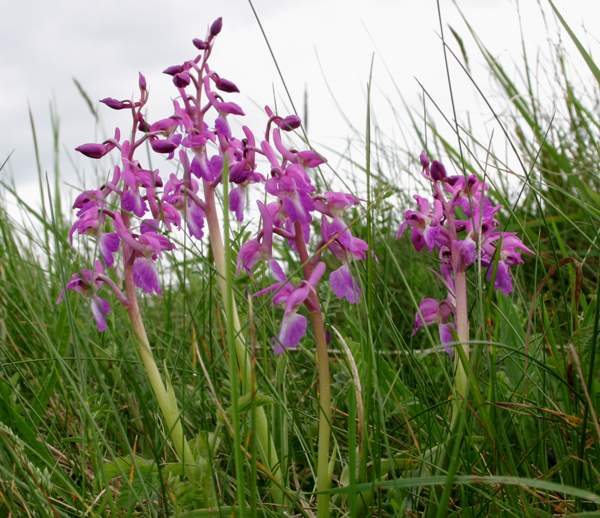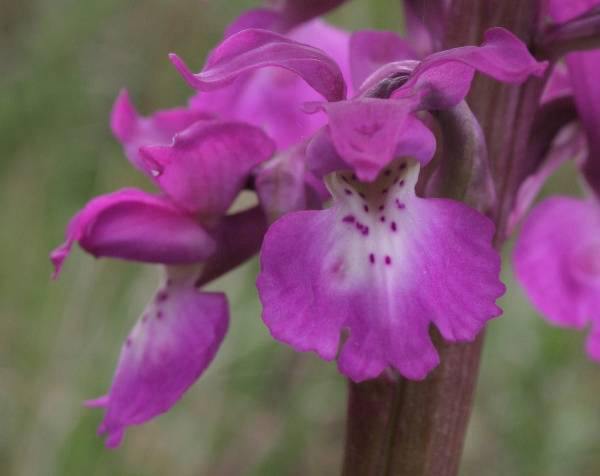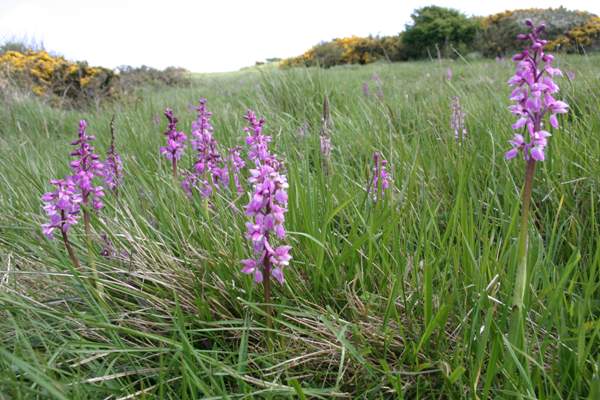Trees Birds Mammals Fish Amphibians Reptiles
Wild Algarve
Bookshop
Orchis mascula - Early-purple Orchid
Phylum: Magnoliophyta - Class: Liliopsida - Order: Orchidales - Family: Orchidaceae

Description
This, the first of the native British orchids to flower each year, is still fairly common and widespread in the UK and Ireland. Orchis mascula grows to around 45cm tall, although taller specimens have been recorded. It has 3-8 basal leaves which are shiny, dark green and usually marked with large dark purple spots. There are 2-3 further small leaves sheathing the stem, which is often flushed purple.

The inflorescence is oval when the flowers are fully open and carries between 10-50 flowers which are deep pink. Occasionally pure white flowers are found but these are scarce.
Distribution
Early-purple Orchid is also present throughout much of Europe, but in the far south it is replaced by Orchis olbiensis - Southern Early-purple Orchid. In central Europe it is replaced by Orchis mascula subsp. speciosa (synonym Orchis ovalis).
Habitat
Orchis mascula grows in calcareous substrates and can be found in woodland and grassland.

Flowering times
Early-purple Orchids bloom from April to June. The specimens shown on this page were photographed in Wales during in April.
Varieties and Hybrids
Hybrids
Hybrids between Early Purple-orchid and the Lady Orchid Orchis purpurea, and Early Purple Orchid and Green-winged Orchid Anacamptis morio have been described but are not confirmed.
Etymology
The genus name Orchis means 'testacles', a reference to the twin tubers of orchids in this genus. The specific epithet mascula means 'masculine' and refers to the form of the underground tubers.
Reference sources
The Plant List
Sue Parker (2023) Wild Orchids of Wales - how, when and where to find them; First Nature e-book (Amazon Kindle format)
Chris Thorogood and Simon Hiscock (2014) Field Guide to the Wildflowers of the Algarve; Kew Publishing
Anne and Simon Harrap (2005) Orchids of Britain and Ireland; A&C Black
Pierre Delforge (2005) Orchids of Europe, North Africa and the Middle East; A&C Black
Den Nordiska Floran (1992) Bo Mossberg, Stefan Ericsson and Lennart Stenberg; Wahlstrom & Widstrand
Sue Parker's latest ebook is a revised and enlarged edition of Wild Orchids in The Burren. Full details here...
Buy it for just £5.95 on Amazon...
Sue Parker's new ebook is a comprehensive and fully revised edition of her acclaimed field guide to the Wild Orchids of Wales. Full details here...
Buy it for just £5.95 on Amazon...
Sue Parker's 5-star acclaimed field guide to the Wild Orchids of the Algarve is now available as an ebook. Full details here...
Buy it for just £5.95 on Amazon...
Please Help Us: If you have found this information interesting and useful, please consider helping to keep First Nature online by making a small donation towards the web hosting and internet costs.
Any donations over and above the essential running costs will help support the conservation work of Plantlife, the Rivers Trust and charitable botanic gardens - as do author royalties and publisher proceeds from books by Pat and Sue.